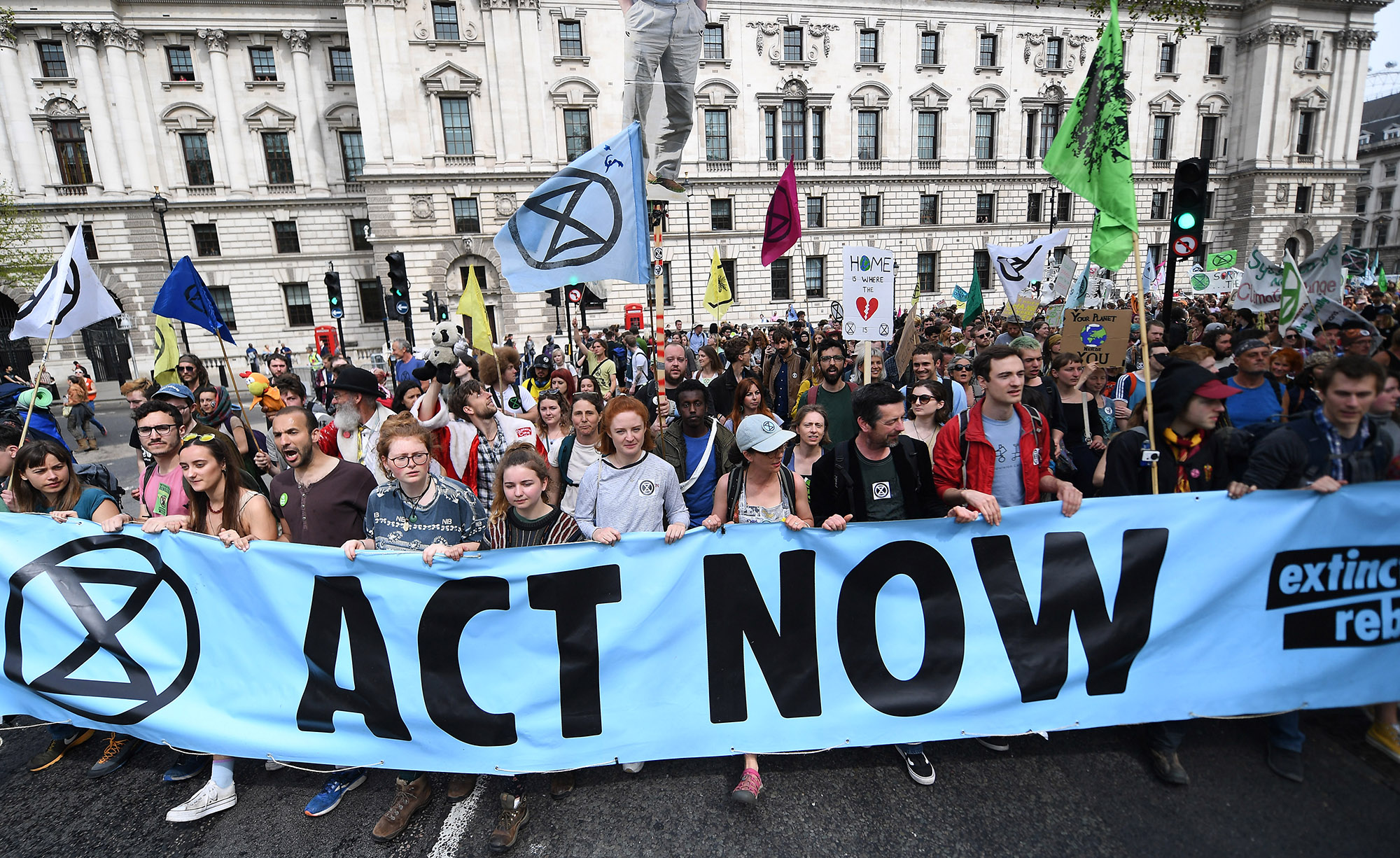I. The Crimes
“This ongoing inaction of people in power, and the companies responsible, will in the future no doubt be remembered as a crime against humanity.”
For fossil fuel executives, these words were really nothing new. Streamed live by Time magazine on 28 May 2019, they reflected a sentiment that had been articulated as far back as 2008, when James Hansen, one of the world’s leading climate scientists, told members of the US Congress that the chief executives of firms such as ExxonMobil and Peabody Energy should be accorded the same treatment as war criminals. Hansen’s point was that these men were “actively spreading doubt about global warming in the same way that tobacco companies blurred the links between smoking and cancer”.
Unlike the seven CEOs of Big Tobacco, however, whose testimony before US Congress in the mid-1990s had led to a perjury probe and multiple criminal investigations, the fossil fuel executives had never been called to account. So strong was their hold over US and international politics, it seemed, so all-encompassing their power, that there wasn’t a regulatory regime on the planet with the teeth to bite into their business model.
 Students take part in a demonstration against climate change in Aachen, Germany on 21 June 2019, inspired by the student strike movement #FridayForFuture sparked by Greta Thunberg of Sweden, the 16-year-old climate activist. (Photo: EPA-EFE / Friedemann Vogel)
Students take part in a demonstration against climate change in Aachen, Germany on 21 June 2019, inspired by the student strike movement #FridayForFuture sparked by Greta Thunberg of Sweden, the 16-year-old climate activist. (Photo: EPA-EFE / Friedemann Vogel)
But somehow the call to arms of 28 May 2019 felt different. For one thing, it was made by Greta Thunberg, the 16-year-old Swedish schoolgirl who had singlehandedly inspired the #schoolstrike4climate campaign in August 2018, when she had staged a protest on the steps of her country’s national legislature. Four days before Thunberg’s 24 May 2019 speech, 1.4 million schoolchildren in 130 countries had followed her lead to join one of the largest environmental protests the world has ever seen, a civil disobedience campaign mounted by distraught and wised-up teenagers who carried placards that read “Please don’t burn my future!” and “System change not climate change!”
For another thing, in the 11 years since Hansen had first called for the fossil fuel chiefs to be charged, the climate had spun out into a whole new vortex. In 2008, when Hansen made his submission, the concentration of carbon in the atmosphere was at 385 parts per million — that same year, he had been the lead author on a study published in the Open Atmospheric Science Journal that argued for a drop to below 350 ppm, since this was “the optimum carbon dioxide level for maintaining a planet similar to that on which civilisation developed”. Now, the CO2 concentration was at 415 ppm, a level not seen for three million years, when the Arctic was ice-free and trees grew in Antarctica.
And aside from the crop-killing floods, drinking water-denuding droughts, landscape-consuming wildfires and sea-level-raising glacier melts this was causing on multiple continents at once with a frequency never before encountered, there was, of course, the third thing: the fact that global emissions from the burning of fossil fuels had reached an all-time high in 2018.
Which may have explained why, when it came to their call for justice, the kids could count on some formidable support.
From world-renowned economist Jeffrey Sachs, who laid out on CNN.com why climate deniers in the Trump administration had “blood on their hands”, to firebrand journalist Kate Aronoff, who argued in a widely cited essay for Jacobin magazine why “it isn’t hyperbole to say that fossil fuel executives are mass murderers”, it was clear that the terms of engagement had shifted.
Sure, Sachs and Aronoff were coming on incredibly strong, but again, this was an entirely new climate zeitgeist. So much so that even the financial sector, usually the last to opt for reason over profit, felt forced to relent. After mid-April 2019, when UK reserve bank governor Mark Carney and his French counterpart François Villeroy de Galhau sent a climate collapse bulletin to central bankers and the investment community at large, it was open season on financiers.
 Extinction Rebellion climate change protesters demonstrate in Parliament Square in London, Britain, on 23 April 2019. (Photo: EPA-EFE / Andy Rain)
Extinction Rebellion climate change protesters demonstrate in Parliament Square in London, Britain, on 23 April 2019. (Photo: EPA-EFE / Andy Rain)
In late April in London, members of a burgeoning civil disobedience movement for the grownups, known as Extinction Rebellion (XR), superglued themselves to the entrance of the stock exchange and blockaded traffic outside Goldman Sachs. Although they aimed wide of the mark — JPMorgan Chase, which had funded the fossil fuel industry to the tune of $64-billion in 2018, got off scot-free — the shotgun approach seemed to work. Not entirely related to XR’s actions and yet not entirely unrelated either, on 21 June the world’s largest sovereign wealth fund, which manages $1-trillion of Norway’s assets, was given the parliamentary go-ahead to dump more than $13-billion of its holdings — a comparatively tiny number, and yet the most significant fossil fuel divestment anywhere, ever.
All of which is a very necessary background to a largely unreported event that happened in the shadow of Africa’s second-largest mall on a Friday afternoon in late May 2019.
II. The Shareholders
“Our call to you is to divest from Sasol Africa Limited for the following reasons,” the young activist began. A few hundred metres away, in Umhlanga’s Gateway Mall, thousands of her contemporaries were numbing themselves on brand names and designer booze, but the teenagers out here did not have the luxury of money or time. These activists, from the townships around Durban, had come with a pre-prepared statement they wanted to read — to a representative of the investment management firm, Allan Gray.
“Sasol is the second-largest emitter of greenhouse gases (GHG) in South Africa and has been identified as one of the 100 fossil fuel companies linked to 71% of global industrial greenhouse gas emissions since 1988,” their chosen spokesperson went on. “Yet Sasol has failed to set any GHG emission reduction targets.”
It was a killer opening, especially the 71% since 1988 part. Whether the woman from Allan Gray knew it or not, 1988 was the year that James Hansen had convinced the US Senate of the direct causal link between rising temperatures and the burning of oil, coal and natural gas.
Thanks to this pivotal testimony, President George HW Bush had promised to use the “Whitehouse effect” to battle the “greenhouse effect,” but less than a month later Exxon’s public affairs manager would recommend in an internal memo that the company “emphasise the uncertainty” in the data.
“Thus began the most consequential lie in human history,” wrote Bill McKibben in his seminal Falter (page 75), before reminding us how Exxon was joined by Chevron, Shell, Amoco and others in a largely successful attempt to bamboozle the citizens of the world. Since then — that is, in just the last 30 years — humanity has sat and watched, seemingly helpless, as more than half of the carbon ever emitted by industrialised society has been pumped into the skies.
Above all, the activists bused into Umhlanga’s central business district on 24 May 2019 were there to show that they weren’t helpless. They were part of Greta Thunberg’s global army, those 1.4 million young people from 130 countries whose weapons were mostly the facts. For these kids, the war against climate collapse was less about the personal commitment to recycling and veganism than it was about the public dismantling of the nexus between politics and profit — particularly, the mind-blowing reality that 100 fossil fuel companies, unregulated by any of the world’s governments, were causing more than two-thirds of the damage. And Sasol, as the Durban contingent well knew, was at number 45 on the list.
“The stock market value of fossil fuel companies is based on the obsolete assumption that fossil fuel extraction and use can continue without limit,” the spokesperson said, as the 20-minute statement was drawing to a close. “As such, much of the value of these companies is illusory.”
What these kids also knew, of course, was that if the South African government wasn’t going to hinder Sasol — as we’ll see below, the evidence was overwhelming that our government would simply continue to help the company — they needed to hit where it hurt. In just the previous two days, Sasol had lost R38-billion of its market value (or 18% of its share price) due to revelations that its Lake Charles Chemical Project in Louisiana, US, was $1-billion over budget. This coincidence in timing, although it had nothing to do with climate breakdown, was for the protesters a sublime affirmation of the conglomerate’s Achilles’ heel.
Because another factor in the war on the climate destroyers was the global uptick in effective shareholder activism.
In December 2018, a first-of-its-kind resolution filed by a group of institutional investors had demanded that ExxonMobil (number five on the list of the 100 worst offenders) disclose its short-, medium- and long-term greenhouse gas reduction targets, an event that exposed an unexpected chink in the giant’s armour.
In April 2019, after Royal Dutch Shell (number nine on the list) had demonstrated its willingness to adopt emissions targets, activist shareholder group Follow This had granted the company a reprieve.
And in May, concerned about their own company lagging behind, investors in BP (number 11) had voted overwhelmingly in favour of public reporting on the compatibility of any future business deals with climate risks.
Meanwhile, back in South Africa, as the young protesters in Umhlanga were no doubt aware, Standard Bank shareholders were about to cast a historic vote. Proposed by the Raith Foundation and shareholder activist Theo Botha, with support from advocates for responsible investing Just Share, the resolution asked for the disclosure of information on the extent to which the bank’s activities rendered it vulnerable to the new climate reality. Ultimately, the resolution would fail — on 30 May 2019, 61% of shareholders would vote against.
Would this have surprised the kids outside the Gateway Mall? Perhaps not. As Daily Maverick’s Sasha Planting reported prior to the Standard Bank vote, Allan Gray was one of the major institutional investors that were less than impressed. The reason given by Andrew Lapping, the firm’s chief investment officer, was this:
“When we think about climate change, we think immediately of energy and extractive industries like coal-fired power stations and coal mining. But what about the cement industry? It’s a massive contributor to emissions. And what about lending into the agricultural sector? Lending to agriculture is a social good, but it’s risky from a climate perspective. Add to that the fact that feedlot farming is a massive contributor to C02 emissions. There are so many climate risks.”
So many, it seemed, that the shareholding of the Allan Gray Equity Fund in Sasol was as un-concerning to the firm as its shareholding in British American Tobacco. According to Sherelee Odayar, project officer of the South Durban Community Environmental Alliance, which had helped to organise the 24 May protests, the statement of the township activists was signed by the representative from Allan Gray — with the promise that she would hand it over to senior management. At the time of writing this, as Odayar told Daily Maverick, no response had been received.
But while Allan Gray remains the second-largest shareholder in Sasol, at a total of 11% of the shares, it wasn’t just this fund manager that the kids were targeting. The same memorandum was signed by representatives of Investec and Old Mutual, which hold 3.7% and 3.0% respectively, and again the same thing — crickets.
And yet in December 2018, when this writer asked Alex Anderson, the Sasol head of group media relations, why the company had sidestepped a proposed shareholder resolution to prepare an annual report on what it was doing to ensure its survival in the face of climate breakdown — a resolution similar to the one that BP has now accepted — the response arrived within 24 hours.
The sole reason for refusing the resolution, Anderson stated, was that the company intended to publish a “Climate Change Report” in August 2019. “Sasol made this commitment publicly,” he informed Daily Maverick, “as climate change management is a priority for the board.”
III. The Subsidies
As a fossil fuel conglomerate, a publicly listed multinational that emits more carbon dioxide than the oil-soaked nation of Oman, how does one “manage” climate change?
The answer to this question, if we are to take the company at its word, is readily available in a number of places, including the integrated report suite of 2017, a 12-pager from the same year and a comprehensive response to the Carbon Disclosure Project.
In brief, “Sasol supports the UN Paris Agreement on climate change,” and seeks to “limit global warming to well below 2°C above pre-industrial levels.” Also, while Sasol “agrees that climate change is a global issue”, it continues to “engage actively with the South African government” on mitigation and adaptation policy.
“A cautious and aligned approach has been adopted,” the fossil fuel company states, “balancing the national priorities of reducing poverty and achieving economic growth with international commitments.”
It is the pledges like these, which tend to run on into hundreds of pages of technical sub-reports, that have thus far provided cover to the oil majors and their shareholders in the face of the above-mentioned onslaught. At COP24 in Poland in 2018, a Shell executive even went so far as to boast that his company had written an entire section of the Paris Agreement — an event that possibly explains not only why respected South African firms such as Allan Gray, Old Mutual and Investec can safely ignore the probing questions of township activists, but also why Sasol could break with its quick-turnaround ethos and ignore the questions put to it for this article.
What the “cautious approach” is designed to overlook, ultimately, is the fact that the 2015 Paris Agreement had already been written off as meaningless in the weeks before its signing, mostly because hard reduction targets were never going to be imposed on any of the signatories. The binding national commitments of the Kyoto Protocol, as Daily Maverick and many others have pointed out, were ditched at Copenhagen in 2009, when then-US president Barack Obama got the leaders of Brazil, India, China and South Africa to agree to voluntary and free-floating targets.
The upshot is now a matter of public record. By December 2018, two months after the Intergovernmental Panel on Climate Change had warned that global emissions needed to be halved by 2030 if warming was to be limited to 1.5°C — the cut-off beyond which the structures of modern civilisation begin to unravel — the New York Times was reporting that the Paris Agreement had condemned us all to 3.3°C.
And so to the part where Sasol says it “engages actively” with the South African government. As the legitimately angry youth now realise, if anything reveals the intimacy of the relationship between governments and fossil fuel companies it’s less the “alignment” of their mutual mitigation strategies than the subsidies that the former grant to the latter — which the International Monetary Fund has now estimated at an astonishing $5.2-trillion a year, roughly 6.5% of global GDP.
Released in May 2019, the IMF report attracted huge international attention — a remarkable outcome for a subject generally considered boring as hell. On 28 May 2019, when Greta Thunberg was suggesting that the ongoing inaction of people in power would be remembered as a crime against humanity, UN secretary-general Antonio Guterres was tweeting that “fossil fuel subsidies mean using taxpayers’ money to boost hurricanes, spread droughts and melt glaciers.”
The subject remains dull, of course, which suits the fossil fuel companies down to the proverbial ground. But as the climate crisis worsens, it’s likely that the work of researchers such as Jesse Burton, Tawney Lott and Britta Rennkamp, who have waded through the data to give us a picture of how much the South African government has been dishing out over the years to the likes of Eskom, Sasol and PetroSA, will become increasingly significant.
Without getting stuck in the weeds, the researchers show how Sasol, on top of the direct subsidies it receives, bags economic rent through the import parity price, an apartheid legacy that guarantees returns for domestic refiners.
“Sasol’s excessive profits as a result of the pricing rules have been a bone of contention,” they write, referring to a case that came before the Competition Tribunal in 2006. They also estimate the value of market price transfers to Sasol in 2012 — “the only year for which data was available” — at $127.4-million.
While their definition of subsidies is wide, there are a few things that the research doesn’t cover. For instance, the fact that the largest shareholder in Sasol, at 11.6%, is the PIC, including the 67 million shares managed on behalf of the Government Employees Pension Fund — a holding that is technically funded by the South African taxpayer.
Also, unlike the IMF, the paper doesn’t cover post-tax subsidies. These are defined in the IMF report as subsidies that account for the difference between actual consumer fuel prices and “how much consumers would pay if prices fully reflected supply costs plus the taxes needed to reflect environmental costs and revenue requirements.”
In other words, even the world’s most influential institution for the fostering of economic growth has begun to factor in the costs that fossil fuel companies foist on society when it comes to climate collapse and the noxious gases they spew into the air — gases that are causing tens of thousands of premature deaths across the globe every year.
IV. The Reich
Sasol’s coal-to-liquid Secunda plant, which was built by the apartheid state with technology developed by the Nazis, is the single largest point source of CO2 emissions anywhere on Earth. Known as the Fischer-Tropsch synthesis, the technology succeeded because IG Farben — the company that would go on to produce Zyklon B gas, a pesticide used extensively to kill Jews in the Holocaust — improved the economics and the yield. After the war, executives of the IG Farben Company would be tried before US Military courts in Nuremberg.
The so-called IG Farben Trials, writes Kate Aronoff in her pivotal essay for Jacobin magazine in February 2019, is “one of the best parallels for trying corporate executives for crimes against humanity”.
Aronoff’s basis for the parallel is the October 2018 Intergovernmental Panel on Climate Change report, which states that the death toll from the crisis may easily creep into the hundreds of millions. She also points out that while fossil fuel executives aren’t technically guilty of genocide — as in, they aren’t targeting specific ethnic groups — they do appear guilty of crimes against humanity as defined by the United Nations:
“[A] widespread or systematic attack directed against any civilian population, with knowledge of the attack.”
The difference, she concedes, is that global heating is the hardest of “abstract problems” because every minute of every day we all use the products that the burning of fossil fuels generates.
“But supply creates demand,” Aronoff goes on. “And while free-market dogmatists may think otherwise, there’s no reason why the popularity of a product means it should exist in perpetuity when the risks are so colossal and there are alternatives at the ready.”
Those alternatives are EVs and renewables, of course, which are now cheaper than fossil fuels even without the subsidies. Which leaves nothing but the vested interests still in control — and nothing but the kids and the courts to fight those vested interests.
In the case of the courts, we are already beginning to see some remarkable victories.
In March 2019, the European Parliament held a hearing into Exxon’s 40-year-plus support for the climate denial movement, while multiple cities and counties across the US continue to file lawsuits against the oil majors.
And so here in South Africa, the global zeitgeist has arrived with impeccable timing. As Daily Maverick reported on 10 June 2019, President Cyril Ramaphosa is among five respondents named in a landmark High Court case that seeks redress for the “deadly air” on the Mpumalanga and East Gauteng Highveld. The court papers, prepared and filed by the Centre for Environmental Rights, take issue with the South African government for not enforcing its own air quality standards, an “oversight” that has lasted 12 years and resulted (according to expert testimony attached to the application) in thousands of deaths and tens of thousands of chronic illnesses.
The papers are clear about which two corporations the government is failing to call to account: They are the public utility Eskom and the private conglomerate Sasol. But while the application goes into great detail on the mercury, lead, benzene, nitrogen dioxide, ozone, particulate matter and sulphur dioxide emitted by these fossil fuel giants, what it doesn’t mention are the carbon emissions.
Nowhere in the 500-page submission, for instance, do we come across the mind-bending fact that if Eskom was a country, the 205 million tons of carbon it spews into the atmosphere every year would place it 29th in the world, just ahead of Argentina. Or the fact that Sasol’s 67 million tons would place it 50th, ahead of Oman.
Put another way, the most serious environmental challenge to the South African government in recent history does not address the most serious environmental threat to humanity’s immediate future.
 Mineral resources and energy minister Gwede Mantashe at a Sasol Shondoni colliery inauguration near Secunda. (Photo: Gallo Images / Sunday Times / Moeletsi Mabe)
Mineral resources and energy minister Gwede Mantashe at a Sasol Shondoni colliery inauguration near Secunda. (Photo: Gallo Images / Sunday Times / Moeletsi Mabe)
On the one hand, the reasons for this are as obvious as they are depressing — the battles must be carefully chosen, because the vested interests, as championed by mineral resources and energy minister Gwede Mantashe, have an inordinate hold over the game.
On the other hand, with the permafrost in the Arctic north melting 70 years early, with a “Day Zero” water crisis having just arrived for 10 million Indians in the city of Chennai, with global heating and drought now driving agriculture in the Northern Cape to collapse, climate breakdown is no longer an impending event.
It is here — and the people responsible are running out of places to hide. DM




 Minerals and Engergy Minister Gwede Mantashe at a Sasol Shondoni colliery inauguration on July 5, 2018 near Secunda. (Photo: Gallo Images / Sunday Times / Moeletsi Mabe)
Minerals and Engergy Minister Gwede Mantashe at a Sasol Shondoni colliery inauguration on July 5, 2018 near Secunda. (Photo: Gallo Images / Sunday Times / Moeletsi Mabe) 